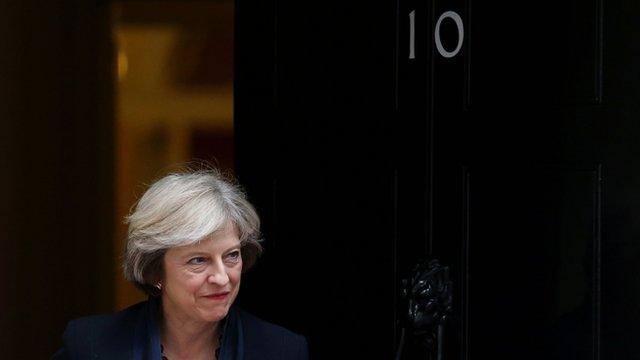Heads go to Downing Street with 'dire' funding warning
- Published
- comments

Head teachers are warning they might have to reduce school hours
Head teachers have written to Theresa May to warn that a funding crisis could make schools reduce hours, lay off staff or stop teaching some subjects.
The letter to the prime minister has been signed by the heads of every state school in West Sussex, who argue they need £20m in emergency funding.
They say the "distraction" of grammar schools cannot be a priority ahead of basic funding and staffing.
The government has promised a complete overhaul of school funding in England.
But the plans for a national funding formula, which would address inequalities in school funding, have been postponed.
'Dire financial position'
The head teachers, from more than 250 primary, secondary, special schools, academies and local authority schools in West Sussex, say that without £20m emergency transitional funding, ahead of the funding formula, they will have to make cuts.
A group of pupils and head teachers will go to Downing Street on Tuesday to deliver the letter, which is also being sent to more than 100,000 West Sussex parents.
The lack of progress on funding, they say, has meant "a crippling effect on our already dire financial position".
The head teachers have told the prime minister that without extra funds there will be cuts to schools from next spring.

The funding letter will be delivered to Downing Street by head teachers
This could include reducing school hours, bigger class sizes, not replacing staff and making teachers redundant.
The head teachers have told the prime minister that schools have "no more fat to trim".
"Schools are struggling to function adequately on a day to day basis, and, in addition, we are severely hampered in our ability to recruit and retain staff, work with reasonable teacher-pupil ratios and to buy basic equipment," says the letter.
Jules White, head of Tanbridge House School in Horsham, said heads were not "sabre-rattling" and these were not empty threats.
"We will look at every option to avoid such drastic steps," he said, but school finances were so stretched they would have to take such difficult decisions.

Jules White wants the government to focus on the basic provision of funding and staff
Mr White said head teachers wanted the government to focus on the practical necessities before being "distracted" by policies such as expanding grammar schools.
"There are fundamentals - finance and the supply of teachers. That's what we want the conversation to be about," he said.
"If you want rapid school improvement, fund them adequately."
Mr White said parents had been very supportive of heads' protests about funding.
"Parents get the unfairness," he said.
Schools in West Sussex have argued they are particularly disadvantaged by the current funding arrangements.

Head teachers in West Sussex say they are struggling with inadequate budgets
They miss out on the higher funding levels available to inner-city schools, such as extra support targeted at deprivation and pupils who do not speak English as a first language.
There is also a London weighting which increases spending on the capital's schools.
For a secondary school of about 1,500 pupils, the heads say that a school in West Sussex will receive £2.7m less per year than a school in an "average" London borough.
Even with an extra £20m, the West Sussex schools say they would still receive £200 per pupil per year less than the national average.
The schools in West Sussex say they receive £1,800 less in per pupil funding than schools in inner London.
The cumulative impact, say the West Sussex heads, is that over the past five years, "school age children in each London borough have, on average, received £1bn more school funding than their counterparts in West Sussex".
'Record funding'
The Department for Education said that school funding was at record levels - £40bn per year, including £2.5bn in pupil premium payments supporting disadvantaged children.
But the department has said that the "current system for distributing that funding is outdated, inefficient and unfair".
It means that "a school in one part of the country could receive over 50% more than an identical school with exactly the same children, simply because of an accident of history".
Plans to overhaul school funding had been announced by the previous Education Secretary, Nicky Morgan.
But the introduction of a national funding formula, due to begin from next year, has been postponed until 2018-19.
Last year, the "least fairly funded" councils received additional funding, with West Sussex being given £930,000.